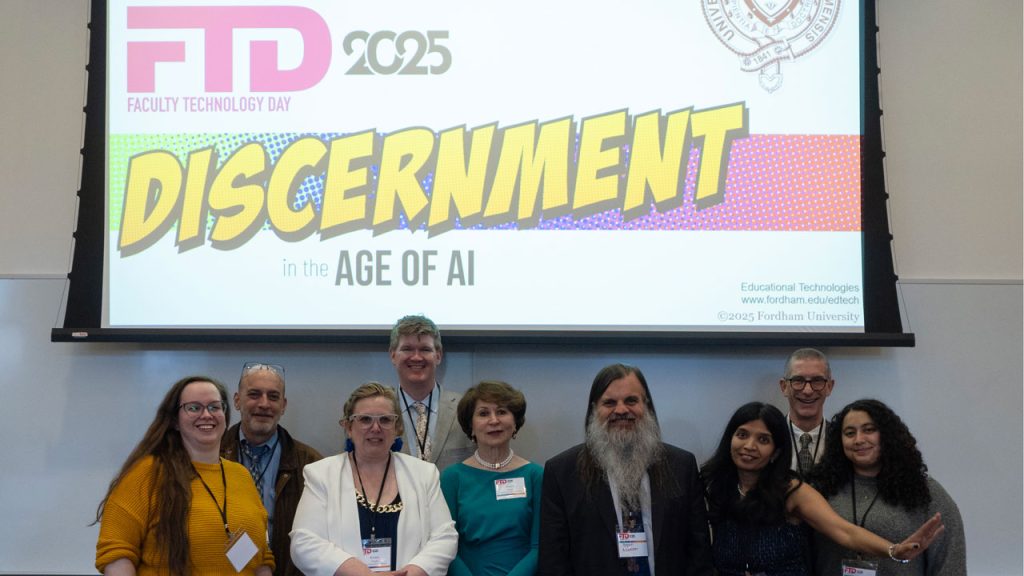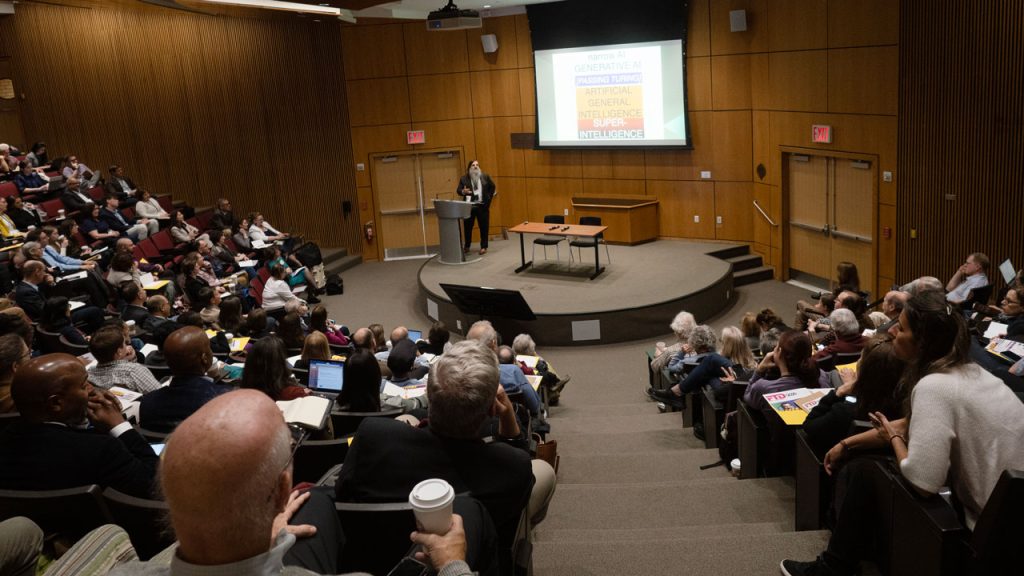“AI is not the future. It’s the present,” said Fordham Chief Information Officer Anand Padmanabhan in his opening remarks on Faculty Technology Day on May 21. Organized by the Fordham IT: Educational Technologies team, the education technology symposium drew 200 Fordham faculty members and administrators to Lincoln Center—the largest crowd in the event’s 26-year history—to examine how AI and other tools are reshaping higher education.
Four Scenarios for AI in Academia
Keynote speaker Bryan Alexander, a Georgetown Senior Scholar and well-known futurist, offered four possible futures for universities as AI continues to evolve—some good, some troubling.
AI’s hallucinations—responses that include false information—could make academic expertise more valuable, he said. Or AI could become a cheaper, “good enough” substitute for college. Alternatively, universities could resist AI entirely and market themselves as a “retro” education option. And in the last scenario, AI could fundamentally alter society and force universities to rethink their mission and “reboot assessments from the ground up.”
So which future should we brace ourselves for? Alexander said most likely all of these scenarios would “come true in different places at different times.” But he could not fully envision a path of total resistance. Banning it in a classroom or at the university level would be like a game of whack-a-mole, he explained. “People have phones—they’ll just get online.”
Critical Thinking and AI
Throughout the talks and breakout sessions, many acknowledged AI’s disruption. Alexander called Generative AI “a powerful, easy tool for cheating” that also “makes stuff up.”
Fordham President Tania Tetlow spoke of the threat it posed to entry-level jobs. But in the spirit of this year’s Ignatian theme—“Discernment in the Age of AI”—she championed Fordham’s Jesuit values to teach students to use their emotional intelligence and critical thinking skills to thoughtfully engage with AI.
“AI is a tool that’s going to be used for a whole lot of good and a whole lot of bad at the same time,” she said in closing. “So how do we help our students use it to matter?”
Tapping Fordham’s AI Expertise
Fleurin Eshghi, associate vice president of educational technologies and research computing, said that according to an IT survey, faculty were engaging with AI, which she found encouraging. But many expressed the need for more workshops and guidance on concerns like plagiarism.
Eshghi’s team does offer ongoing AI support that includes a weekly blog, curated resource pages, faculty workshops, and guidance on Fordham’s AI-related policies.
The event also displayed the AI expertise of Fordham faculty and staff who taught numerous breakout sessions, from how to use AI tools like NotebookLM to exploring the ethics of AI use through an Ignatian lens.
“The breadth and depth of knowledge within our own community demonstrates Fordham’s capacity to be a thought leader in the evolving landscape of AI in higher education,” said Alan Cafferkey, Ph.D., director of education technologies.
A New Center for Educational Innovation
More support is coming in the form of a new Center for Educational Innovation, which Provost and Senior Vice President Dennis Jacobs, Ph.D., announced would debut in the fall. Also in the works, he said, is an AI hub that will support faculty and students in exploring responsible AI use across teaching, learning, and research.
Senior Instructional Technologist Kristen Treglia said everyone is looking forward to the opening of the Center for Educational Innovation, which will aim to amplify faculty voices around AI and other emerging technologies as well as foster innovation in teaching.
“You can’t separate pedagogy and technology today,” said Treglia.

Further AI Resources and Recommended Reading
- The EdTech Bible by Kristen Treglia
- Teaching with AI by C. Edward Watson and Jose Antonio Bowen (2024 Faculty Technology Day keynote speakers)
- Co-Intelligence: Living and Working with AI by Ethan Mollick
- Future of Education Observatory and the AI, Academia, and the Future Substack by Bryan Alexander

